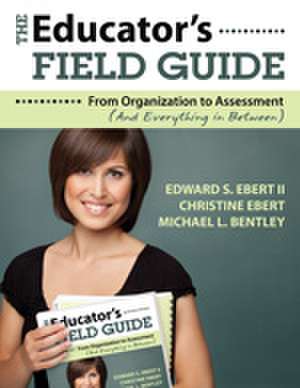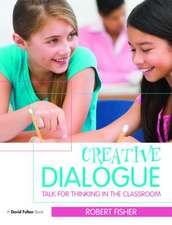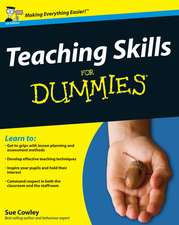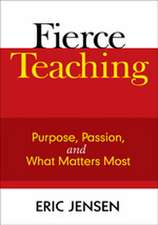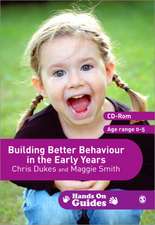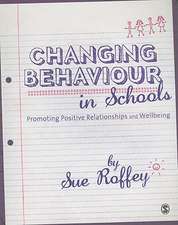The Educator's Field Guide: From Organization to Assessment (And Everything in Between)
Autor Edward S. Ebert, Christine K. Ebert, Michael L. Bentleyen Limba Engleză Paperback – 18 mai 2011
Preț: 305.11 lei
Nou
Puncte Express: 458
Preț estimativ în valută:
58.39€ • 60.50$ • 48.73£
58.39€ • 60.50$ • 48.73£
Carte tipărită la comandă
Livrare economică 21 martie-04 aprilie
Preluare comenzi: 021 569.72.76
Specificații
ISBN-13: 9781412969499
ISBN-10: 1412969492
Pagini: 240
Dimensiuni: 216 x 279 x 14 mm
Greutate: 0.66 kg
Ediția:1
Editura: SAGE Publications
Colecția Corwin
Locul publicării:Thousand Oaks, United States
ISBN-10: 1412969492
Pagini: 240
Dimensiuni: 216 x 279 x 14 mm
Greutate: 0.66 kg
Ediția:1
Editura: SAGE Publications
Colecția Corwin
Locul publicării:Thousand Oaks, United States
Recenzii
"You will find both the classic research in these areas of your work as a teacher as well as up-to-date discussions and explanations of key topics such as student diversity, special needs, lesson planning, instructional techniques, and assessing your students’ academic progress."
"In my thirty years of observing pre-service and in-service teachers, I had not found a guide that would cover everything an emerging teacher needs to consider until reading The Educator’s Field Guide. This book's unique five-step approach integrates the roles of teacher, classroom manager, and reflective practitioner into a continuous process essential to good teaching."
"Uniquely designed, The Educator's Field Guide will surely become a reliable, cornerstone reference in any teacher’s library—one that will be revisited time and again throughout a career—as well as a vital addition to the well-thumbed, instructional resources of those in the field of teacher education."
"An Educator's Field Guide combines key concepts in education into one convenient resource. The material covered is simplified without being too simplistic. The unit on classroom management is particularly helpful with advice from leading experts and tips for beginning the school year on the right foot. Students and beginning teachers will appreciate the professional knowledge shared in this book and will avoid many pitfalls common to this exciting, yet challenging field."
"The authors have created the most eminently practical guide for pre-service and early career teachers that I have encountered in recent years. In a teaching world that is often intimidating, these three experienced education professors have hit it right on. This is a guide that a teacher can use on Monday morning and then reflect with on Friday afternoon. They tell us how to TEACH rather than how to prepare students for standardized tests. Hooray for this team of practical educators!"
"Every classroom teacher and education policymaker should read this fantastic book. Each topic is clearly articulated in a very practical manner. Organizing each unit by First, Second, Now, Tomorrow, and Finally is pedagogically brilliant."
"In my thirty years of observing pre-service and in-service teachers, I had not found a guide that would cover everything an emerging teacher needs to consider until reading The Educator’s Field Guide. This book's unique five-step approach integrates the roles of teacher, classroom manager, and reflective practitioner into a continuous process essential to good teaching."
"Uniquely designed, The Educator's Field Guide will surely become a reliable, cornerstone reference in any teacher’s library—one that will be revisited time and again throughout a career—as well as a vital addition to the well-thumbed, instructional resources of those in the field of teacher education."
"An Educator's Field Guide combines key concepts in education into one convenient resource. The material covered is simplified without being too simplistic. The unit on classroom management is particularly helpful with advice from leading experts and tips for beginning the school year on the right foot. Students and beginning teachers will appreciate the professional knowledge shared in this book and will avoid many pitfalls common to this exciting, yet challenging field."
"The authors have created the most eminently practical guide for pre-service and early career teachers that I have encountered in recent years. In a teaching world that is often intimidating, these three experienced education professors have hit it right on. This is a guide that a teacher can use on Monday morning and then reflect with on Friday afternoon. They tell us how to TEACH rather than how to prepare students for standardized tests. Hooray for this team of practical educators!"
"Every classroom teacher and education policymaker should read this fantastic book. Each topic is clearly articulated in a very practical manner. Organizing each unit by First, Second, Now, Tomorrow, and Finally is pedagogically brilliant."
Cuprins
List of Figures and Tables
Preface
Acknowledgments
About the Authors
Unit I Instructional Organization
Unit I Outline
Unit I Concept Map
Unit I Pep Talk
First: Long-Range Planning
Second: Short-Range Planning
Now: Classroom Organization
Tomorrow: Instructional Presentation
Finally: Communication With "Outsiders"
Conclusion
Unit I Appendix
Unit II Classroom Management
Unit II Outline
Unit II Concept Map
Unit II Pep Talk
First: Keys to Successful Classroom Management
Second: Establishing a Management-Based Learning Environment
Now: Compiling Your Plan: A Template for Classroom Management
Tomorrow: Implementing the Plan and Responding to Student Behavior
Finally: Assessing Your Classroom Management Plan
Unit II Appendix
Unit III Instruction
Unit III Outline
Unit III Concept Map
Unit III Pep Talk
First: The Curriculum
Second: The Student
Now: Conceptualizing Your Role
Tomorrow: Putting it All Together
Finally: This Is a People Profession
Unit IV Assessment
Unit IV Outline
Unit IV Concept Map
Unit IV Pep Talk
First: The Basics of Assessment
Second: Making Assessment a Part of Instruction
Now: Writing Tests
Tomorrow: Analyzing the Results of Your Assessment
Finally: Assessment and the High-Stakes Environment
Glossary
References
Index
Preface
Acknowledgments
About the Authors
Unit I Instructional Organization
Unit I Outline
Unit I Concept Map
Unit I Pep Talk
First: Long-Range Planning
Second: Short-Range Planning
Now: Classroom Organization
Tomorrow: Instructional Presentation
Finally: Communication With "Outsiders"
Conclusion
Unit I Appendix
Unit II Classroom Management
Unit II Outline
Unit II Concept Map
Unit II Pep Talk
First: Keys to Successful Classroom Management
Second: Establishing a Management-Based Learning Environment
Now: Compiling Your Plan: A Template for Classroom Management
Tomorrow: Implementing the Plan and Responding to Student Behavior
Finally: Assessing Your Classroom Management Plan
Unit II Appendix
Unit III Instruction
Unit III Outline
Unit III Concept Map
Unit III Pep Talk
First: The Curriculum
Second: The Student
Now: Conceptualizing Your Role
Tomorrow: Putting it All Together
Finally: This Is a People Profession
Unit IV Assessment
Unit IV Outline
Unit IV Concept Map
Unit IV Pep Talk
First: The Basics of Assessment
Second: Making Assessment a Part of Instruction
Now: Writing Tests
Tomorrow: Analyzing the Results of Your Assessment
Finally: Assessment and the High-Stakes Environment
Glossary
References
Index
Notă biografică
Edward S. Ebert, II is Professor Emeritus of Education at Coker College in Hartsville, South Carolina and an award winning educator. With a degree in Psychological Foundations of Education, he has taught courses in educational psychology, elementary science methods, child development, classroom management, assessment, and creative problem solving. He as written a dozen books, including elementary science methods (Teaching Constructivist Science, K-8/Corwin Press), creative thinking and science teaching, introduction to education, classroom pragmatics: management and assessment (The Educator¿s Field Guide/Corwin Press), and an examination of public education in the American culture. Ebert has given numerous presentations nationally and internationally, and has taught science education and educational psychology for a semester at Shanghai International Studies University, Shanghai, P.R. China. He now resides in Wellfleet, MA, where he continues to publish educational materials and serves on a regional school board.
Descriere
Everything a teacher needs to survive?and thrive!
The Educator's Field Guide helps teachers get off to a running start. The only book that covers all four key areas of effective teaching—organization, classroom management, instruction, and assessment—this handy reference offers a bridge from college to classroom. Helpful tools include:
The Educator's Field Guide helps teachers get off to a running start. The only book that covers all four key areas of effective teaching—organization, classroom management, instruction, and assessment—this handy reference offers a bridge from college to classroom. Helpful tools include:
- Step-by-step guidance on instructional organization, behavior management, lesson planning, and formative and summative assessment
- User-friendly taxonomic guides to help readers quickly locate topics
- The latest information on student diversity, special needs, and lesson differentiation
- Teacher testimonials and examples
- Explanations of education standards and initiatives
